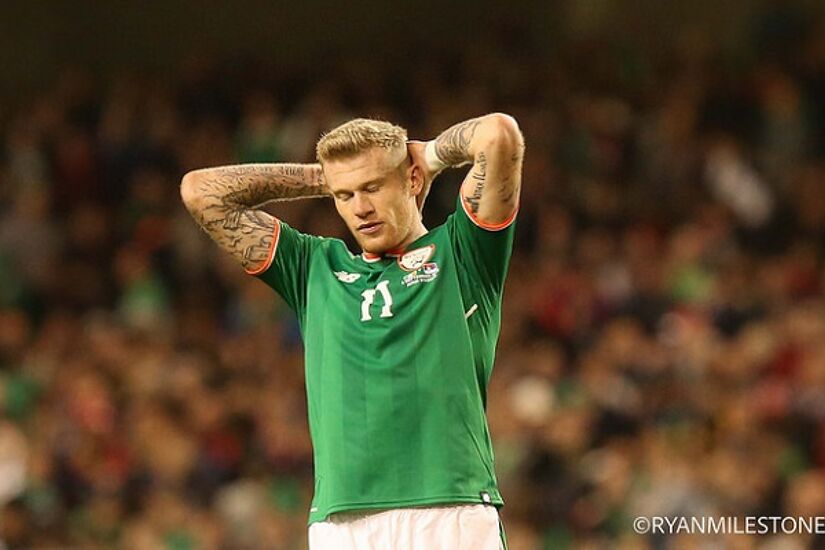Dave Donnelly: Lansdowne roar returns but Ireland revert to type

Credit: Michael P Ryan (ETPhotos)
The atmosphere, for once, was electric.
A near-capacity Aviva Stadium brimmed with belief ahead of kick-off that one of Martin O'Neill's trademark big performances was in the offing.
It was a similar feeling that engulfed the renovated stadium – so often a hub of unease and tension in its short history – ahead of the Euro 2016 play-off against Bosnia, and Germany a month earlier.
The signing section in the south stand, frequently a heavy lifter amid the tepid atmosphere in the less-than-cauldron-like Lansdowne Road were, for once, not required to punch above themselves.
Their reward? To be serenaded before kick-off by a singer with acoustic guitar banging out dodgy renditions of Dancing in the Moonlight, Joxer Goes to Stuttgart and, most uncomfortably, the Foggy Dew.
That they endured with just as much dignity as they did the brass band during March's visit of Wales – they were thankfully absent, but the far-too-loud PA system nevertheless provided enoug tinny ear sounds.
The PA was again too loud for the national anthems, the volume of the house band drowning out the signing of 50,000-odd fans and mitigating against the building of any organic atmosphere in the stadium.
Some of the optimism that coursed through the ground was undoubtedly inspired by the announcement of the starting eleven an hour before kick-off, and the news that the ineffective Harry Arter and Glenn Whelan had been dropped for Wes Hoolahan and David Meyler.
That sense of daring and anticipation seemed to funnel down from the fans to the team, as they played with a sense of calm and adventure not seen since that 2-0 win over Bosnia that sealed Ireland's place at Euro 2016.
At one point, early in proceedings, Darren Randolph feigned to roll the ball quickly to Stephen Ward before, perhaps from muscle memory, declined the option in order to slow the pace down.
It was a move he wasn't to repeat many more times as the roars of the crowd urged him to move the ball quickly and to feet, and his long throws to his full backs were a key part of the momentum Ireland generated in the early stages.
Within ten minutes, Shane Duffy had the ball in the Austrian net, as he had early in last week's draw with Georgia, but this time the goal was correctly ruled out for offside against the Derry defender.
Ireland boss Martin O'Neill had opted to return to the midfield diamond that has been a feature during all of the best performances of his tenure, beginning with the home draw against Scotland in 2015.
With Hoolahan stationed at the tip of the diamond behind Jon Walters and Shane Long, and James McClean and Robbie Brady to either side, Ireland had plenty of attacking intent but little in the way of width.
Serbia's 3-4-3 formation, by contrast, seemed ideally-suited to exploit the narrowness of O'Neill's chosen formation, with wingers Aleksandar Kolarov and Antonio Rukavina pushed up behind the menacing front three of Dusan Tadic, Filip Kostic and Aleksandar Mitrovic.
While O'Neill's employing of the diamond has always appeared a ploy to make midfield a battleground and disrupt opposition possession, Slavoljub Muslin's formation seems designed to get as many of his best players on the field as possible.
The very best of those is Manchester United's Nemanja Matic, and his seeming omnipresence meant Serbia could compete in midfield despite being outnumbered, and his duel with Meyler was fascinating.
Meyler, one of the most naturally-athletic players in English football, seems an obvious choice to play at the base of O'Neill's diamond and, as he did in the win away to Austria, he provided impetus and bite from deep.
And it was needed during a fast-paced opening period that frequently saw Serbia's mobile front three carve open the Irish defence with apparent ease – Meyler frequently dropped into the backline and acted as a sweeper when Mitrovic looked to get in behind.
The unwillingness of Kostic and Tadic to get back and defend did create space for Stephen Ward and Cyrus Christie to get forward, and the right-back in particular linked up well with Brady to create a number of ultimately unfruitful overlaps.
In defence, however, the lack of protection from the admittedly game McClean and Brady was where Ireland looked vulnerable, and it was little surprise the game's only goal came from Christie being outnumbered on the Serbian left.
The failure of McClean, twice, to clear a loose ball on the edge of the box presented Kostic with an opportunity to tee up the overlapping Kolarov on the left, and his shot carried too much venom for Randolph to do anything but parry it onto the underside of the bar.
The early optimism had dissipated by support from the stands remained fulsome in the closing half-hour, even as a wilting Hoolahan was withdrawn for brawny striker Daryl Murphy as O'Neill went with a de facto front three (Walters operating where Hoolahan had previously).
Following Nikola Maksimovic's dismissal over 20 minutes from time, Ireland should have been expected to take control of the game but, if anything, Ireland became more narrow and more direct and the visitors always had a suitable out-ball to the wings.
Ireland could only muster one chance of note in the final half-hour – Murphy's effort following a fortuitous deflection – and even that was the product of a long ball flicked on by the tireless Long.
Murphy should have had a penalty when Callum O'Dowda – brought on to provide some of the width missing for the previous 75 minutes – crossed and the striker was dragged back, but it wasn't to be.
Ireland's World Cup fate is now out of their hands with even a play-off spot now dependant on results elsewhere as well as a maximum haul of six points from their two remaining fixtures, which includes a trip to Cardiff on the final day.
The atmosphere in Cardiff City Stadium will no doubt be buzzing once again, and a minority of Irish fans will have to once again summon the effort to believe in their team and another Houdini act from Martin O'Neill's men.

